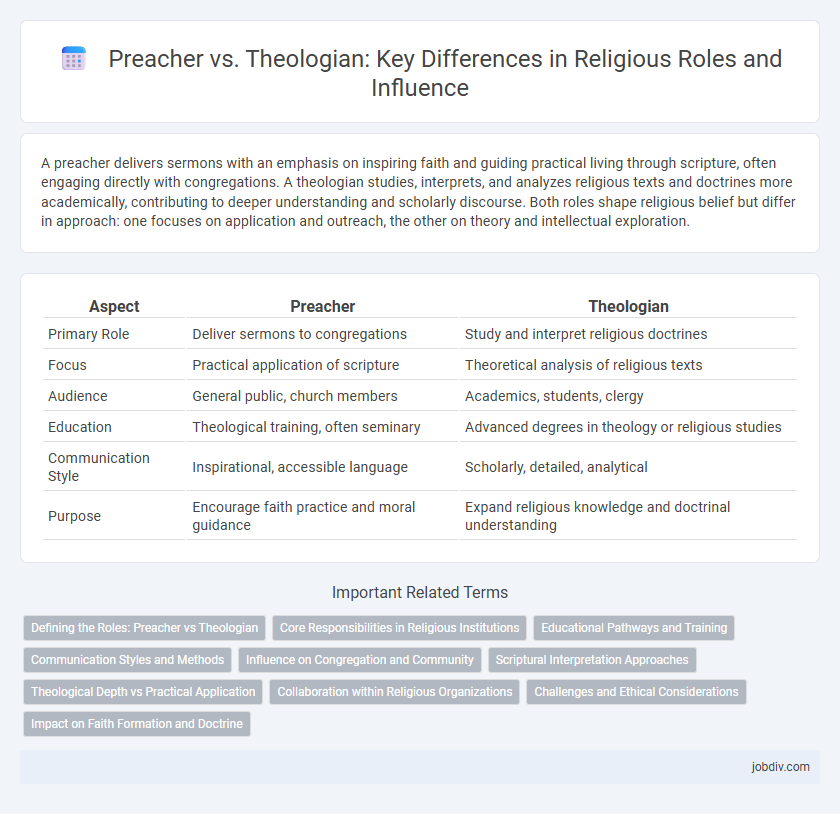A preacher delivers sermons with an emphasis on inspiring faith and guiding practical living through scripture, often engaging directly with congregations. A theologian studies, interprets, and analyzes religious texts and doctrines more academically, contributing to deeper understanding and scholarly discourse. Both roles shape religious belief but differ in approach: one focuses on application and outreach, the other on theory and intellectual exploration.
Table of Comparison
| Aspect | Preacher | Theologian |
|---|---|---|
| Primary Role | Deliver sermons to congregations | Study and interpret religious doctrines |
| Focus | Practical application of scripture | Theoretical analysis of religious texts |
| Audience | General public, church members | Academics, students, clergy |
| Education | Theological training, often seminary | Advanced degrees in theology or religious studies |
| Communication Style | Inspirational, accessible language | Scholarly, detailed, analytical |
| Purpose | Encourage faith practice and moral guidance | Expand religious knowledge and doctrinal understanding |
Defining the Roles: Preacher vs Theologian
A preacher primarily focuses on delivering sermons and guiding congregations through practical application of scripture to inspire faith and moral conduct. Theologians engage in rigorous study and interpretation of religious texts, developing systematic frameworks to understand divine truths and doctrines. While preachers emphasize communication and pastoral care, theologians concentrate on academic research and critical analysis within religious traditions.
Core Responsibilities in Religious Institutions
Preachers primarily focus on delivering sermons and guiding congregational worship to inspire faith and moral living within religious institutions. Theologians engage in scholarly research, interpreting sacred texts and developing doctrinal understanding to inform faith practices and institutional teachings. Both roles collaborate to deepen spiritual knowledge and support religious communities through distinct but complementary responsibilities.
Educational Pathways and Training
Preachers often pursue practical ministry training through Bible colleges, seminaries, or church-based programs emphasizing homiletics and pastoral care, focusing on effective communication and community leadership. Theologians typically engage in advanced academic study, earning degrees such as a Master of Divinity, Master of Theology, or PhD, concentrating on critical analysis of religious texts, systematic theology, and historical contexts. While preachers prioritize applied ministry skills, theologians emphasize scholarly research and theological theory, reflecting their distinct educational pathways and training objectives.
Communication Styles and Methods
Preachers emphasize oral communication, using storytelling, sermons, and emotional appeal to connect with congregations and inspire faith. Theologians rely on analytical writing, scholarly discourse, and critical examination of religious texts to convey complex theological concepts. Preachers engage through personal and communal interaction, while theologians focus on academic rigor and interpretative clarity.
Influence on Congregation and Community
Preachers shape congregational life through powerful sermons that connect biblical teachings to everyday experiences, inspiring faith and moral action. Theologians influence communities by providing deep scriptural interpretations and ethical frameworks that guide religious education and doctrinal development. Both roles are essential in nurturing spiritual growth and fostering communal values within faith-based groups.
Scriptural Interpretation Approaches
Preachers primarily emphasize practical application and oral communication of Scripture to inspire and guide congregations, often using narratives and relatable examples for clarity. Theologians focus on systematic, academic analysis of biblical texts, exploring historical context, original languages, and doctrinal consistency to deepen understanding. Both approaches contribute uniquely to Scriptural interpretation, balancing lived experience with scholarly rigor.
Theological Depth vs Practical Application
Preachers emphasize practical application of religious teachings, aiming to inspire and guide congregations through relatable messages and everyday relevance. Theologians prioritize theological depth, engaging in critical analysis and scholarly interpretation of sacred texts to deepen doctrinal understanding. Balancing preaching's accessibility with theology's intellectual rigor enriches both spiritual growth and academic discourse within religious communities.
Collaboration within Religious Organizations
Preachers and theologians collaborate closely within religious organizations to deepen scriptural understanding and effectively communicate faith principles to congregations. Theologians provide scholarly interpretations and doctrinal insights that inform sermon content, while preachers apply this knowledge in practical, inspiring ways during worship services. This partnership strengthens religious teachings and fosters a more engaged, educated community of believers.
Challenges and Ethical Considerations
Preachers often face the challenge of addressing diverse congregational beliefs while maintaining accessibility and spiritual inspiration, which demands balancing theological accuracy with pastoral sensitivity. Theologians grapple with complex doctrinal analysis and critical scholarship, confronting ethical considerations regarding interpretation authority and potential conflicts with faith traditions. Both roles must navigate the ethical responsibility of truthful teaching, avoiding misrepresentation or oversimplification of religious doctrines to preserve integrity and trust within their communities.
Impact on Faith Formation and Doctrine
Preachers emphasize practical application and inspirational messages that directly shape congregational faith formation through relatable sermons and community engagement. Theologians contribute to doctrine by providing critical analysis, systematic theology, and scholarly interpretation that deepen understanding and refine religious beliefs. Together, preachers influence lived faith experiences while theologians ensure doctrinal integrity and intellectual rigor in religious teachings.
Preacher vs Theologian Infographic

 jobdiv.com
jobdiv.com